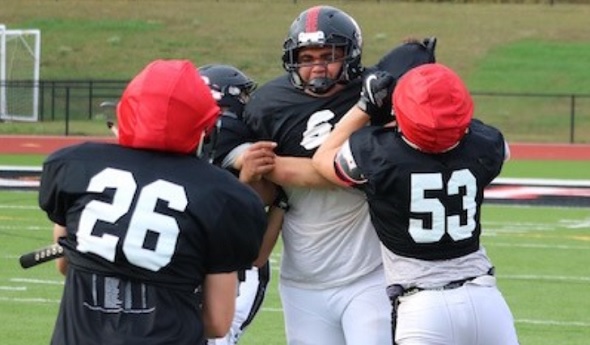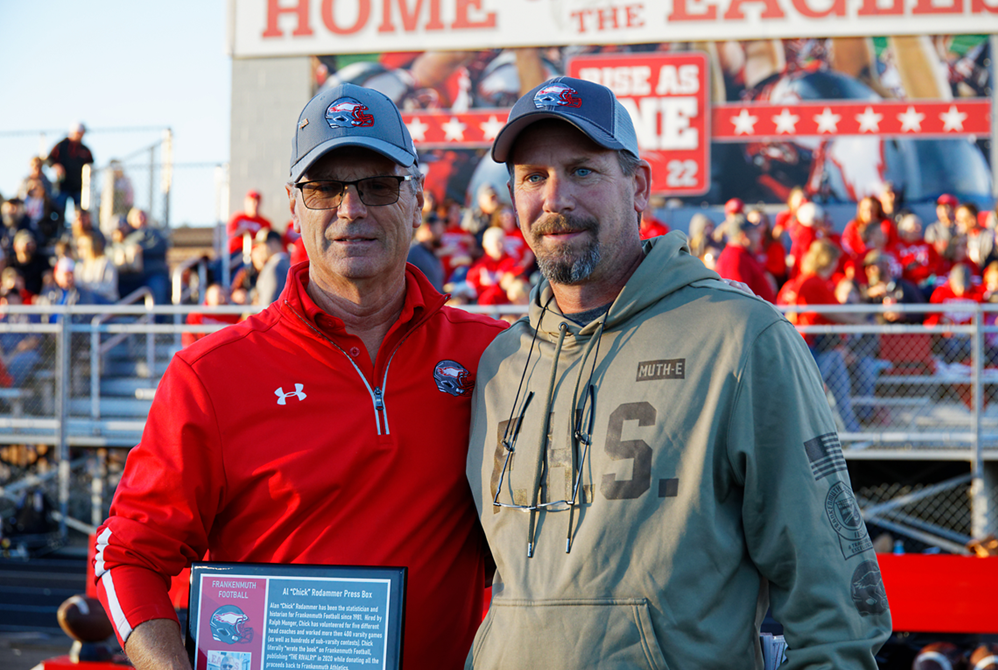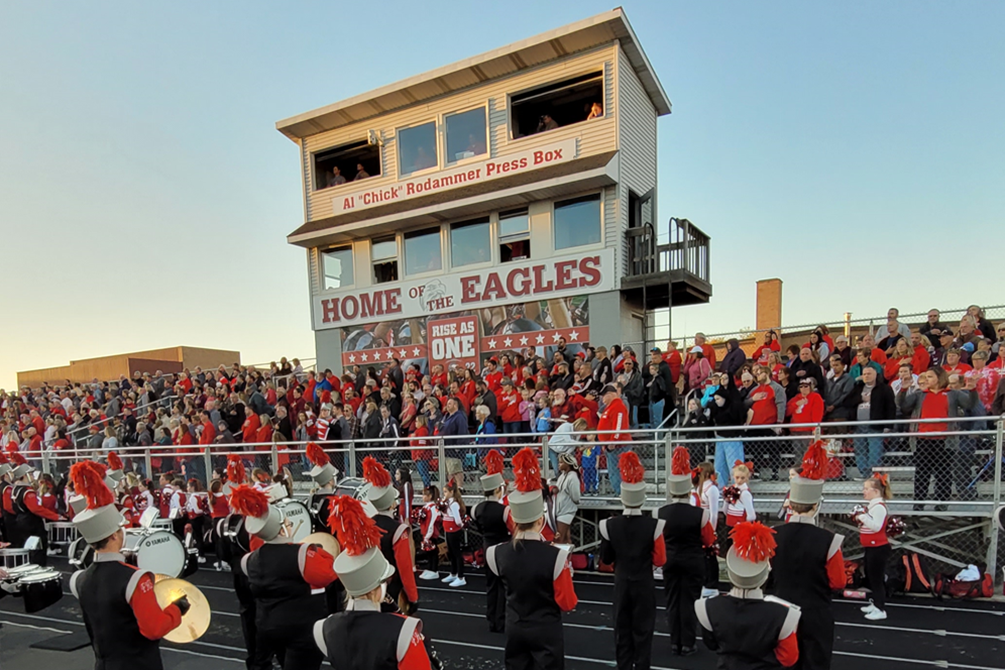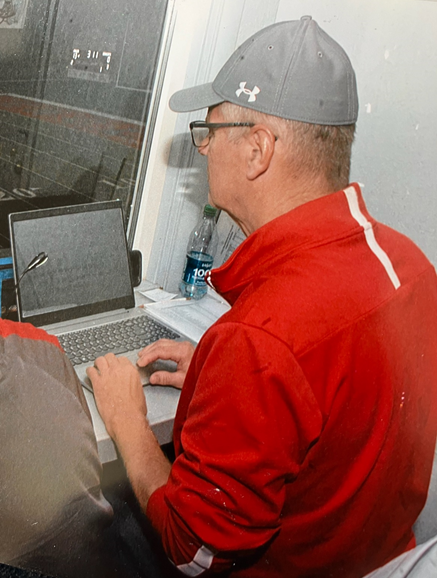
Ford Swaps Frustration for Focus
October 24, 2017
By Tim Robinson
Special for Second Half
Midway through the 2016 season, Marcus Ford was frustrated.
 He was on the Pinckney football team, but not playing much.
He was on the Pinckney football team, but not playing much.
A big part of that was due to his size — 6-foot-5 and over 400 pounds — but then-defensive coordinator Rod Beaton sensed there was more.
“We feel that we coach very hard,” said Beaton, now Pinckney’s head coach. “We’re very aggressive (on the varsity), and sometimes it’s an adjustment for juniors to understand that when they come out here, there’s expectations.
“There were a couple times where Marcus was questioning … whether football was for him.”
“I didn’t want to be there,” Ford said. “I thought, ‘This is stupid. Why am I here so late?’”
And then came a change.
“It came to a point where he went home and took a day off to re-gather himself,” Beaton said. “Marcus came back and he said to me, ‘Coach, I really want to be a part of things here.’”
And Ford did more than that.
He grew from a young man who bristled when his coaches pointed out mistakes to one who doesn’t react as if it were a personal attack, from an overweight kid who admits he was on his way to weighing 600 pounds to a big kid who is a key part of Livingston County’s most successful football team as a senior.
He rarely comes out of games, his coach says, and the quiet giant who rarely interacted with his teammates has transformed into a happy, smiling kid who dishes out and takes teasing from them.
It’s a story of transformation that only football could have done for Marcus Ford, who couldn’t play youth football because of his size and whose options for high school athletics seemed limited to football for the same reason.
“I may sound a little clichéd and corny,” Beaton said, “but I think this is why every single coach in America coaches football, to watch the development of a young man, from freshman to sophomore to junior and to see what football has done for him.”
How did Ford do it?
He turned his mental approach 180 degrees and made drastic changes to his diet and work ethic.
One clue came in looking at Pinckney’s roster from 2016 compared to 2017. Last year, Ford was listed at 380, which was about 40 pounds less than his actual weight.
This year, he’s listed at 405, which is a dozen pounds more than what he weighs now.
Last year, he played mostly in mop-up roles.
This year, he is a starter on defense, regularly occupying two blockers at a time, which in turn frees linebackers Cauy Hendee and Levi Collins to make tackles.
“I can play a lot longer,” he said. “I was tired when we were out there, but we don’t believe in the word ‘tired.’ We prefer ‘winded.’ We just need to catch our breath. So I get ‘winded’ a lot less.”
The first thing Marcus decided to change was his diet, and he got his cues by looking in the mirror.
“I didn’t like the muffin cap that was hanging down,” he said. “I didn’t like my stomach hanging over. ... I thought, ‘I don’t what to have a heart attack at age 25.’ I was doing ‘diets,’ per se, but eventually I thought, ‘This is stupid. Cut out pop and eat better,’ And I did.
“The only thing I would eat that was green was green beans, and they had to be made a certain way,” he said. “Now, I’m more like ‘this is somewhat appetizing. Let me try that.’ I don’t eat candy bars anymore. I don’t eat ice cream when my family does. I drink a lot less milk than I used to, and I drink more water.”
 Pinckney offensive coordinator Cody Patton noticed.
Pinckney offensive coordinator Cody Patton noticed.
“His mom came to me about getting a weight plan, and he stuck with it,” Patton said. “They can only do so much in the weight room. When they leave, there’s not much you can control what they put into their bodies.”
But Ford also changed his mindset about football and being coached.
“His first real commitment was ninth-grade high school football, and it was a big adjustment for him,” Beaton said. “We knew there would be days where he might be a little confrontational, there may be some days where he goes through the motions.”
But after that midseason meeting last year, Ford redoubled his efforts in practice and in the offseason.
The first hint that he was a different player came in June, when Ford earned the team’s first bone helmet sticker of the season for effort in a drill.
“It was our first pursuit drill,” Beaton said. “We go four downs, and those kids have to sprint. There’s no exception. Marcus stepped to his gap, made his reads, flew to the football and didn’t say a word, every single time. He did it four times in a row. It really set the stage. I could tell he was wanting do to things right this year.
“When you see a 6-5, 400-pound kid moving with effort and tenacity, you sit there and go, ‘That young man can help us.’”
And so he has.
As a result, Marcus Ford is part of a Pinckney defense that has lifted the Pirates to an 8-1 regular-season record and shared Southeastern Conference White championship. He has transformed from a player who had little stamina to one who can go from opening kickoff to final horn.
“He can play a whole football game,” Beaton said. “He can go through a whole practice. One of the challenges we were talking about in the offseason is he has to put his body and mind in a position to not come off the field.”
That moment came on a warm night early in the season.
“We were in a huddle at Chelsea, and it was late,” Beaton recalled. “He’s drenched in sweat, and I said, ‘Marcus, you need a breather?’ And he said, ‘No, coach. I’m ready.’ That’s pretty cool.”
Asked his ideal weight, Ford said, “I would like to be at 250 if I could,” then laughs. His bone structure is such that at his height, he would be almost gaunt at 250. “I would settle for 340. That’s the dream within a dream goal.”
Next year, he plans to attend college.
“I want to go into bartending or being a head chef, or get a business degree,” he said. “One other choice is going to a police academy. As long as I can run a mile within 15 minutes, I should be good.”
There’s no reason, now, to think he couldn’t accomplish that.
He got his first sack against Dexter.
‘I grabbed him and rolled him over on top of me,” Marcus said. “I would have liked to have landed on him, but I got him down in the backfield. It’s good.”
And football now is fun.
“A lot more fun,” he said.
“Marcus made a concerted effort to our strength and agility program,” Beaton said. “It wasn’t two days at a time, then not be there five or six days. Marcus was there. He would stay after everyone had left and get some extra lifts in or do some extra work to make sure he was putting himself in a (good) position.
“He said, ‘Coach, I want to be your starting nose (tackle).’ The first day of June camp, he ran out to the nose tackle, and we haven’t looked back.”
PHOTO: (Top) A pair of Pinckney blockers try to contain nose tackle Marcus Ford during a practice this season. (Middle) Ford breaks free to get an arm on a ball carrier. (Photos by Tim Robinson.)

Rodammer Stacks 44 Years, 451 Games Tracking Frankenmuth's Football Numbers
By
Steve Vedder
Special for MHSAA.com
September 20, 2024
While Al Rodammer's abbreviated scouting career may have lasted all of one night, it didn't take him long to figure out how he'd spend Friday evenings for the next 44 years.
Rodammer remembers being asked by former Eagles football coach Ralph Munger to drive to Bullock Creek to scout an upcoming playoff opponent. But Rodammer and fellow scout Jeff Reinbold wound up getting lost en route and missed most of the first quarter.
The mix-up didn't sit well with Munger, who "reassigned" Rodammer to a different task: keeping stats for the program.
Instead of fretting about the switch, Rodammer, a former baseball and basketball player at Frankenmuth, embraced the move. Four and a half decades later, Rodammer has kept track of virtually every football stat you can imagine for 451 Eagles games. Starting in 1981, Rodammer has dragged, at first, his trusty pencil and paper, and now laptop to hundreds of cramped press boxes, unsteady roof tops, chilly sidelines or whatever dinky corner space may have been available.
Many people may believe that totaling rushing yards or deciphering passing percentages is a thankless task. The 70-year-old Rodammer, who had the Frankenmuth press box named after him in 2022, prefers to think of his work as a labor of love.
Acting as a bridge between past and present Eagles teams and staying in touch with a community which loves its Friday Night Lights is his way of honoring a highly-successful football program.
 "It's a commitment, but it's also a labor of love," he said. "When they named the press box after me, I thought, "Gosh, I don't know if I deserve this.' I don't do it for the recognition. But when the alumni come back, and to see what the work means to them, that's what I get out of it."
"It's a commitment, but it's also a labor of love," he said. "When they named the press box after me, I thought, "Gosh, I don't know if I deserve this.' I don't do it for the recognition. But when the alumni come back, and to see what the work means to them, that's what I get out of it."
Rodammer's connection with the program far exceeds keeping track of how many passes are attempted or how many yards the Eagles' defense surrenders. He's written two books about the program, including an 82-page history of the Frankenmuth-Millington rivalry. While his initial connection may have been as a failed scout, he's recognized as the program's official historian and leading goodwill ambassador as he's constantly stopped on the street and asked what the Eagles’ chances are for the upcoming season.
One of Rodammer's passions is organizing reunions of past teams, a couple of which included his two sons who played football at Frankenmuth.
When you consider all of Rodammer's contributions to the program, Frankenmuth coach Phil Martin said keeping stats is just a small part of his overall contribution to the program. The data turned in to coaches helps them plot offensive and defensive strategies. But Rodammer's work in writing game stories for community media, digging into archives for long-sought but pertinent information and communicating with past teams is his true value.
"But more than statistics, he's cared for the program for 40-plus years," Martin said. "He's helped tradition and the community in understanding what we have in 69 years of Frankenmuth football."
Rodammer, whose statistics career has covered a half-dozen athletic directors and five head coaches, takes particular pride in not just assembling the typical Friday night numbers, but in putting the long history of Eagles football into perspective. His boundless research of Frankenmuth football has taken him from local libraries to Detroit-area facilities which may contain older stories on the team. He uses that information to ensure the accuracy of his records.
"We've been successful in a lot of athletics like soccer or basketball, but Frankenmuth is a football town," said Rodammer, who added tabulating junior varsity statistics to his resume in 2002. "There's something about football that brings out the community. There are always a lot of older people in the stands who get into it.
"Athletics has a definite impact on the community, no doubt about it."
 Rodammer has missed only four games over his 44 seasons, 28 of which he has been joined by spotter Frank Bender. Two were for weddings, there was one funeral and once the fastpitch softball team he played for was in Minot, N.D., for a tournament. Rodammer is a member of the American Softball Association Hall of Fame.
Rodammer has missed only four games over his 44 seasons, 28 of which he has been joined by spotter Frank Bender. Two were for weddings, there was one funeral and once the fastpitch softball team he played for was in Minot, N.D., for a tournament. Rodammer is a member of the American Softball Association Hall of Fame.
He admits to being a "numbers guy," who developed programs for the Vassar Building Center before retiring 13 years ago, and he also kept statistics for his softball team for 20 years. Rodammer has his own definition of what numbers mean to him.
"I was only an average student, but there is something about stats," he said. "Yeah, I'm probably a little geekish about numbers."
Making the job easier – if not more fun – has been the wild success of the Frankenmuth program. The Eagles have won 62 consecutive conference games, including 12 league titles. Frankenmuth has been to two MHSAA Finals at Ford Field over the last four seasons. The Eagles have had 14 consecutive winning seasons, been to the playoffs 13 straight years and 29 times since 1987. The team is off to a 3-0 start this season and last week became the 14th program in state history to reach 500 victories.
Such success has left Rodammer with more than a few memories. For instance, he lists the team's 1987 playoff upset of Cheboygan as his personal favorite moment. Cheboygan was unbeaten, but the unraked Eagles prevailed 28-21. He also mentions a 28-20 win over powerhouse Ithaca in 2016 that interrupted a stunning string of Yellowjackets successes during an 118-5 run that included four MHSAA Finals titles and two more runner-up finishes between 2009-17. Another memory is Frankenmuth playing in its first championship game at a near-empty Ford Field due to COVID restrictions in January 2021.
Rodammer is hard-pressed to answer what he'd do with his Friday nights if he wasn't toiling away in a press box at a Frankenmuth football game. Maybe he'd work closer with his church, travel to see other local teams play or check off a couple stops toward his ultimate goal – to visit every Big 10 school for a game.
For the moment, at least, skipping a Friday night perched on a rickety chair tucked into the corner of a cramped press box isn't in the plan.
"I have a passion, but I don't do it for recognition," he said of connecting with the Eagles program "I want to keep a commitment from past teams to the present. That's what motivates me.
"I love summers, but every year I can't wait for the fall."
PHOTOS (Top) Al Rodammer, left and Eagles coach Phil Martin take a photo on the night the facility was named for its longtime stat person during the 2022 season. (Middle) The Al "Chick" Rodammer Press Box stands tall before the start of a Frankenmuth game this season. (Below) Rodammer does his work in the corner of the press box. (Top two photos by Chip DeGrace; below photo courtesy of Al Rodammer.)

